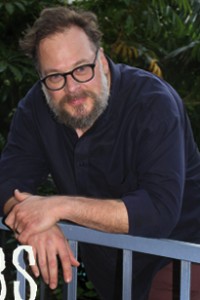Barry N. Malzberg: A Measure of Peace
 Barry N. Malzberg has extensive experience in the SF field as a reader, writer, editor, agent, and critic. He has written about 250 SF stories, more than 30 novels, ten fiction collections, an essay collection, and over 30 non-SF novels, including mysteries and pornography (some very literary), the latter for Olympia Press.
Barry N. Malzberg has extensive experience in the SF field as a reader, writer, editor, agent, and critic. He has written about 250 SF stories, more than 30 novels, ten fiction collections, an essay collection, and over 30 non-SF novels, including mysteries and pornography (some very literary), the latter for Olympia Press.
Malzberg’s short stories are collected in The Many Worlds of Barry Malzberg (1975), The Best of Barry N. Malzberg (1976), Down Here in the Dream Quarter (1976), Malzberg at Large (1979), The Man Who Loved the Midnight Lady (1980), The Passage of Light: The Recursive Science Fiction of Barry N. Malzberg (1994), In the Stone House (2000), and others. SF novels include Universe Day and Gather in the Hall of the Planets (both 1971 as K.M. O’Donnell); Beyond Apollo (1972), the first winner of the John W. Campbell Memorial Award; Revelations (1972); Overlay (1972); Herovit’s World (1973), which is not really SF but rather a mainstream novel about an SF writer; The Destruction of the Temple (1974); Guernica Night (1974); Galaxies (1975); Chorale (1978); The Cross of Fire (1982); and The Remaking of Sigmund Freud (1985).
Malzberg began to become disenchanted with the SF field in the late ’70s, a subject he discusses in essay collection The Engines of the Night: Science Fiction in the Eighties (1982), winner of a Locus Award. His later non-fiction collection Breakfast in the Ruins (2007) encompassed The Engines of the Night, and added a number of additional essays; it won the Locus Award and was a Hugo finalist.
Malzberg’s output slowed considerably in the 1980s, then resurged beginning in the ’90s with dozens of new stories, including several excellent collaborations with Kathe Koja. Notable later works include Hugo finalist ‘‘In the Stone House’’ (1992) and Understanding Entropy’’ (1995), a finalist for the Hugo, Theodore Sturgeon, and Nebula Awards.
He lives in Teaneck New Jersey with his wife Joyce (married 1964). They have two adult daughters.
Wikipedia: Barry N. Malzberg
2002 Locus Magazine interview excerpts
“My last novel The Remaking of Sigmund Freud came out in ’85. Judy-Lynn del Rey wanted that novel, and it was a sentimental occasion for all of us, and alas: I wrote it in utter hopelessness, knowing how good it was and that it was DOA. My agent 30 years ago, Clyde Taylor, said, ‘If you want to keep on in science fiction, you have to take a pseudonym. Otherwise, you can not sustain it.’ And that is the point at which I got out, essentially. He was a good agent and a good man and a decent, warm human being who was an editor, wholly supportive, and essentially he’s saying, ‘In terms of the market, as compared to an unpublished writer, everything you have done is worthless.’
“If you want to take a few steps to the right, or maybe a few miles to the right, Judy-Lynn del Rey was the equivalent of [John W.] Campbell – in the field of fantasy, in the mid-’70s, with a hundred times his budget. As was said at her memorial service, nobody since Campbell came near this kind of influence and power. She was enormous in that way, but that was fantasy. (She was a science fiction editor only by default, and resentfully.) She proved that you could make a bestseller of a genre fantasy: you just made it very long, and you aimed it for a core audience. She knew what the base was, and then you go expand from that base. There have been many publishers and properties that have come to grief trying to do it – these huge, ponderous fantasies. But for Judy-Lynn it worked.”
…
“Could I explain steampunk to my wife? Yeah, I guess I could, but isn’t it silly? How can this be a serious genre? To posit a Victorian culture which has a technological means to support and expand what we call modern computerization…. And now it’s become a style. In Engines of the Night, I said, ‘Decadence is where form overtakes function.’ And that’s steampunk and cyberpunk for you. Alternate history and counter-reality: there’s decadence. That was hot stuff in the ’80s: Elvis Presley as a politician, Winston Churchill as a rock star. My story of Arturo Toscanini as manager of the New York Yankees and Babe Ruth – that’s decadence. In that sense, steampunk is a late manifestation of a process already well advanced.”
…
 “In Breakfast in the Ruins, I took Asimov’s death in 1992 as the single point at which you could say, ‘This before, that after.’ Science fiction as a one-generation field, with a common center and a common language, departed with Asimov. What has happened to science fiction is exactly what happened to classical music in 1920. When Schoenberg and the 12-toners came in, there was no longer a common language. Everybody from Palestrina to Bach to Mahler had written within a tradition, with a sense of extending a dialog. Debussy and Ravel were still there. Then came the 12-tone system, and everything exploded. There was no common language.
“In Breakfast in the Ruins, I took Asimov’s death in 1992 as the single point at which you could say, ‘This before, that after.’ Science fiction as a one-generation field, with a common center and a common language, departed with Asimov. What has happened to science fiction is exactly what happened to classical music in 1920. When Schoenberg and the 12-toners came in, there was no longer a common language. Everybody from Palestrina to Bach to Mahler had written within a tradition, with a sense of extending a dialog. Debussy and Ravel were still there. Then came the 12-tone system, and everything exploded. There was no common language.
“Asimov in a sense was a common center: backward and forward. He had edited these huge anthologies of science fiction in the ’30s, and he extended forward. By the mid-’80s, his magazine was the hot SF magazine. The cutting-edge bore his name. Science fiction, from its inception to his death, was observed, spanned, written and anthologized by Asimov. He was the last vestige of the common voice.
“Not Clarke. Clarke had wandered off – he was in film, he was in popular science. Heinlein (as I wrote in Breakfast in the Ruins) was a strange, paranoid, isolated figure, living behind gun turrets somewhere. He was no rallying-point. It was Asimov! And it’s never been the same since. There are famous writers, but not only are they not famous outside the culture, they are not famous to all within the culture itself. There are plenty of folks who never read a word of Connie Willis and never will, and consider themselves science fiction readers. Same with Sterling and Gibson.”
…
“I put my life into this damn thing. Science fiction was the most important thing in the world to me, for many years. My work shows my seriousness and my intensity. It is still central to me, but I don’t confuse that centrality with anything external. Regardless of any considerations of the permanence of science fiction or the permanence of my work, I really feel I did the work God put me on Earth to do. I have that measure of peace. I don’t know how much talent I have, but I got the most out of it. I don’t have to prove anything. I did a body of work which represented my best possibility, and some of that could not have been done by anyone else. Budrys could have done Breakfast in the Ruins better, but he didn’t do it at all. Phil Klass could have done Herovit’s World better, but he didn’t. And I think it had to be done.”



 Excerpts from the interview:
Excerpts from the interview: Read the complete interview, and biographical profile, in the October 2010 issue of Locus Magazine.
Read the complete interview, and biographical profile, in the October 2010 issue of Locus Magazine.



Pingback:Tweets that mention Locus Online Perspectives » Barry N. Malzberg: A Measure of Peace -- Topsy.com
I love Malzberg’s work, his ferocious, burning, sometimes hilarious pen. And I miss his work. I was one of those who bought “The Remaking of Sigmund Freud” on the day it came out. A pity there weren’t more of us, but there were some of us, still are some of us in fact.
I’m afraid I never “took” to Mr. Malzberg’s work…but, these days, I feel the pain of the arc of his career all too well.
For me, after thirty-five years of failure to get published, I now find the writing of science fiction a less than rewarding experience. I took Mr. Malzburg’s position as “sour grapes,” but I’m feeling much the same way.
I’ve recently been rereading “Herovit’s World” and with the perspective of 35 additional years of life have to say that what I considered in my youth to be an attack on science fiction, I now consider to be a brilliant satire on the literary ghetto that was sf in the 50’s and 60’s. The entire interview with Malzberg in this issue (from which the quotes above are excerpted) is a must-read for students of the history and sociology of science fiction.
Pingback:‘Homenaje a Tolkien’, Varios autores (1992) Parte 3. [Reseña] – CosmoVersus